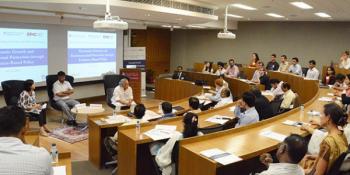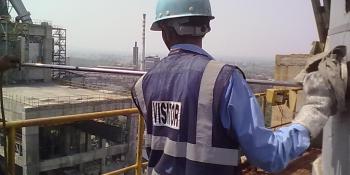Data Systems and Policy Innovations for Reducing Emissions
Data Systems and Policy Innovations for Reducing Emissions
EPoD is collaborating with regulators in one of India’s most industrialized states to test regulatory innovations
EPoD is collaborating with regulators in one of India’s most industrialized states to test regulatory innovations
EPoD researchers are collaborating with the Gujarat Pollution Control Board (GPCB) on a suite of studies to test whether regulation innovations can curb pollution at a low cost to both government and industry.
The collaboration has its roots in a large-scale experiment conducted with research partners from J-PAL, Yale, and the University of Chicago and published in 2013. The intervention severed the ties between environmental auditors and the firms they monitored, and showed that this not only led to more truthful reports by the auditors, but reduced emissions by the factories. The GPCB incorporated several components of the scheme into their practice and invited us to train regulators in data analysis and the use of data.
Since then, EPoD and J-PAL researchers have worked closely with the GPCB developing and testing a device installed directly in factory stacks at 135 sites that allows emissions readings from Continuous Emissions Monitoring Systems (CEMS) to be fed directly to regulators in real time via a digital interface. The project not only promises to deliver a leap in the quality of information that regulators can access, it is being watched closely by India’s Central Pollution Control Board, who know that future market-based mechanisms to control air pollution will depend on quality, real-time data.
Previous work has shown that, without real-time monitoring and incentives, there is significant non-compliance. Based on this, a market-based regime could reduce emissions at low cost – the team estimate a 55 percent reduction in costs for industries relative to fixed standards.
CEMS represent an important breakthrough in the industrial pollution regime in India, which has historically relied solely on manual (hence infrequent) measurement of plant emissions. By enabling regulators and industries to view minute-by-minute industrial pollution data, these new systems strive to improve transparency of information exchange, incentivize pollution abatement and reduce compliance costs. The team expects to observe an improvement in the effectiveness of industrial pollution regulation as regulators now handle sophisticated data, and receive better information regarding plant emissions.
Principal Investigators:
Rohini Pande
Anant Sudarshan, University of Chicago
Michael Greenstone, University of Chicago
Nicholas Ryan, Yale University
This research is supported by:
Harvard University Climate Change Solutions Fund
Harvard University Sustainability Science Program
MacArthur Foundation
International Initiative for Impact Evaluation (3ie)
Central Pollution Control Board
Ministry of Environment, Forests and Climate Change
Shakti Sustainable Energy Foundation
ClimateWorks Foundation
USAID
International Growth Center
This project is implemented by Evidence for Policy Design (EPoD) at the Harvard Kennedy School in collaboration with The Abdul Latif Jameel Poverty Action Lab - South Asia (JPAL-SA).
Highlights
EPoD held a policy dialogue with the Energy Policy Institute of Chicago in New Delhi in July, 2014.
What's the best way for India to continue to increase the standard of living of its citizens while preventing further environmental harm?








